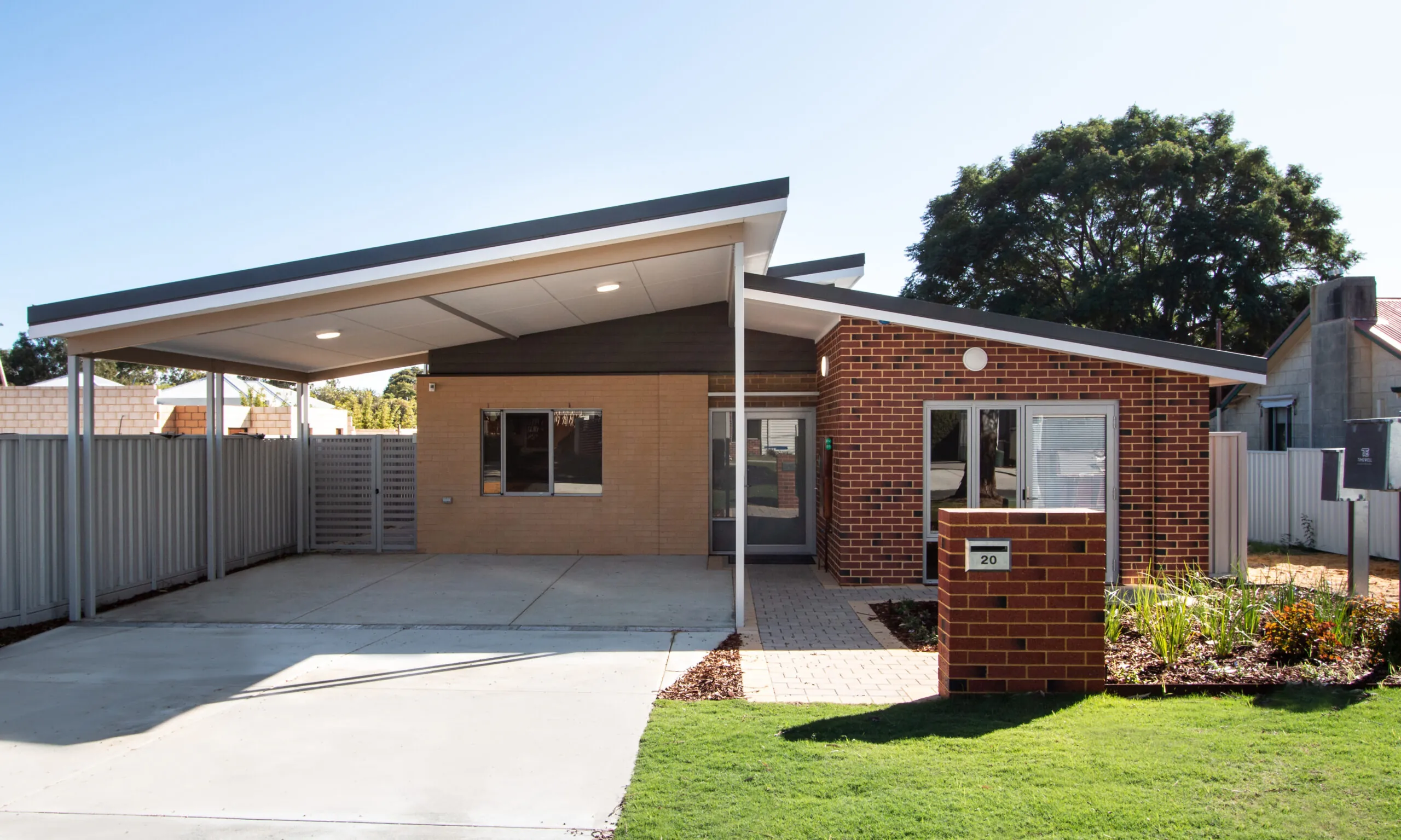Securing the right NDIS housing starts with a thorough understanding of available accommodation options, including STA, MTA, SDA, and SIL, which cater to various support needs. For SDA, eligibility requires extreme functional impairments, with only a small percentage of participants qualifying. Choosing a reliable SDA provider necessitates evaluating their NDIS registration, reputation, and commitment to community integration. Reviewing the location for proximity to essential services and community amenities is crucial for enhancing quality of life. Compliance with standards and effective funding management guarantees a stable living environment. Detailed insights into these areas can greatly aid in making informed housing decisions.
Understanding NDIS Housing Options
Steering through the landscape of NDIS housing options is an essential step for individuals seeking appropriate living arrangements that cater to their specific needs. Understanding the array of housing preferences available is pivotal for participants to make informed decisions that align with their unique circumstances.
The National Disability Insurance Scheme (NDIS) offers a spectrum of accommodation types, each tailored to distinct participant needs. Short-Term Accommodation (STA) provides a temporary respite solution, funded for up to 28 consecutive days annually, ideal for leisure and short-term relief.
Medium-Term Accommodation (MTA) is designed for those in change, granting up to 90 days of support while awaiting permanent housing solutions.
Specialist Disability Accommodation (SDA) addresses the requirements of participants with extreme functional impairments, incorporating sophisticated accessibility modifications.
Supported Independent Living (SIL) is another cornerstone, fostering autonomy by providing support for daily living skills, either in a participant’s current home or within dedicated NDIS residences.
For those seeking heightened independence, Individual Living Options (ILO) offer a bespoke approach, delivering personalized assistance for daily tasks, thereby promoting participant-driven autonomy.
Identifying Eligibility for SDA
Having explored the various NDIS housing options, it becomes apparent that understanding eligibility for Specialist Disability Accommodation (SDA) is an essential component for participants with specific needs. Eligibility hinges on the presence of extreme functional impairment or high support needs, as defined by the stringent SDA criteria set forth by the NDIS. Demonstrating eligibility involves a thorough assessment of the participant’s functional impairment, ensuring that their support needs align with SDA requirements and warrant inclusion in their NDIS plan.
Notably, only about 6% of NDIS participants qualify for SDA funding, underscoring the tailored nature of this support aimed at enhancing home accessibility for those with significant needs. The inclusion of SDA funding in an NDIS plan is not static; it requires an ongoing eligibility assessment to verify continued adherence to SDA criteria, thereby safeguarding the integrity and appropriateness of the support provided.
This dynamic process empowers participants to maintain their independence while ensuring the sustainability of necessary accommodations. Additionally, the continuity of existing SDA funding is assured unless a participant proactively requests changes, providing a stable foundation for maneuvering the complexities of NDIS housing with confidence and autonomy.
Exploring SDA Design Categories
Understanding the intricacies of SDA design categories is essential for tailoring housing solutions to meet the diverse needs of NDIS participants. The SDA framework classifies dwellings into four distinct categories: Basic, Improved Liveability, Fully Accessible, and High Physical Support. Each category corresponds to specific accessibility standards and SDA features, meticulously crafted to support varying levels of disability.
The Basic category provides fundamental accessibility features, guaranteeing that essential safety and livability criteria are met, yet offering minimal customizations. Those seeking enhanced environmental and sensory design elements may find Improved Liveability more suitable, as it caters to participants requiring moderate support.
Meanwhile, the Fully Accessible category sets a higher benchmark with thorough accessibility standards, facilitating seamless mobility within the home environment for individuals with considerable physical impairments. At the pinnacle, the High Physical Support category integrates advanced assistive technologies and cutting-edge design elements, catering to the most complex support needs.
For a dwelling to be eligible for SDA funding, it must be certified and registered under the corresponding design category per the SDA Rules 2021. This rigorous compliance guarantees that each participant accesses housing that fosters independence and greatly enhances quality of life.
Selecting a Reliable SDA Provider
Selecting a reliable SDA provider is a fundamental step in securing appropriate housing for NDIS participants, and it necessitates a diligent evaluation process. Confirming that the provider is registered with the NDIS is paramount, as compliance with enrollment criteria is necessary for meeting funding requirements.
A thorough investigation into the provider’s reputation should include an analysis of reviews and testimonials from current and previous residents. This feedback provides invaluable insights into the quality of support and services rendered, which are integral to the overall living experience.
The provider’s experience with diverse SDA design categories is also an important consideration. Their familiarity with various functional impairments guarantees that they can cater to the specific needs of each participant effectively.
Additionally, support flexibility is essential; providers should offer adaptable care plans that align with individual goals and preferences, empowering participants to live autonomously.
Lastly, assess the provider’s commitment to community integration initiatives. A robust program for fostering community connections can greatly enhance the social and emotional well-being of SDA residents, contributing to a fulfilling and independent living experience.
Selecting a provider with a strong, positive reputation and flexible support options is necessary for achieving ideal outcomes.
Evaluating Location and Amenities
When reflecting on NDIS housing options, an important yet often overlooked factor is the strategic evaluation of location and amenities. Proximity to necessary services such as medical facilities, shopping centers, and public transport greatly enhances accessibility for participants, fostering autonomy and mobility.
A thorough assessment of neighborhood safety is paramount, as it directly impacts individuals’ ability to engage in outdoor exploration, thereby enhancing the quality of life for those with disabilities. Safe neighborhoods offer peace of mind, facilitating a sense of freedom and security for residents.
Community engagement is another significant component to reflect upon. The presence of community amenities, such as parks and recreational areas, plays a crucial role in fostering social interactions and engagement. These spaces provide opportunities for residents to connect, participate in communal activities, and build meaningful relationships.
Additionally, evaluating the local support network, including healthcare providers and community organizations, is essential. These resources are indispensable for providing personal care and assistance, contributing to the overall well-being of NDIS participants.
Research underscores the importance of strong community ties and support systems, which have been linked to improved independence and outcomes for participants. Consequently, selecting a favorable location is vital for maximizing the benefits of NDIS housing.
Navigating Investment Considerations
As we consider the thorough evaluation of location and amenities in NDIS housing, it becomes equally important to address the strategic investment considerations that underpin successful property ventures in this sector.
The burgeoning demand for Specialist Disability Accommodation (SDA) properties, driven by approximately 30,000 eligible NDIS participants, indicates robust market trends that savvy investors can harness. However, the pathway to capitalizing on these trends requires meticulous planning and informed investment strategies.
Foremost, investors must anticipate the elevated construction costs inherent in SDA properties due to the rigorous compliance benchmarks dictated by the NDIS and the National Construction Code (NCC). Collaborating with seasoned builders and certified SDA providers from the project’s inception guarantees alignment with these standards, thereby safeguarding eligibility for NDIS funding.
Location remains a pivotal determinant of investment success; properties situated near essential community services, healthcare facilities, and efficient public transport systems not only enhance tenant satisfaction but also bolster property valuation.
Furthermore, understanding the financial landscape—such as the likelihood of higher interest rates on NDIS property loans and the necessity for sustained compliance—empowers investors to optimize returns while maneuvering the complexities of this promising market.
Ensuring Compliance With Standards
Achieving compliance with standards in Specialist Disability Accommodation (SDA) is a cornerstone of successful investment and tenant satisfaction in this sector. Confirming that SDA properties meet the rigorous certification requirements set by the NDIS is crucial.
These requirements are delineated in the SDA Rules 2021, which define specific design categories such as Basic, Improved Liveability, Fully Accessible, High Physical Support, and Robust. Each category entails distinct standards for safety and accessibility, tailored to meet the diverse needs of individuals with disabilities.
The certification process is critical, involving a thorough assessment by accredited assessors to verify that the properties align with the National Construction Code (NCC) standards. This guarantees that accessibility features are ideally integrated.
Once certified, properties can be registered with the NDIS, confirming their readiness for occupancy by eligible participants.
Compliance monitoring plays an essential role in sustaining SDA registration. Regular audits and compliance checks confirm ongoing adherence to established standards, prioritizing participant safety and wellbeing.
This systematic approach not only safeguards investments but also empowers tenants by providing the freedom to live in a secure and supportive environment that meets their unique needs. Collaborating with NDIS plan managers can further streamline the process, ensuring that funding is effectively managed and that participants receive the support they need to navigate their housing options.
Managing Funding and Tenancy
Guaranteeing compliance with SDA standards sets the foundation, but successfully managing funding and tenancy is equally integral to maximizing the benefits of NDIS housing investments. Key to this process is effective funding management. Since NDIS funding for Specialist Disability Accommodation (SDA) is tied directly to the participant, it is crucial that tenants are verified NDIS participants with the requisite funding. This guarantees that property owners receive the intended rental returns, essential for covering care costs.
Tenant communication is another cornerstone in managing funding and tenancy efficiently. Clear dialogue with tenants about their responsibilities, such as personal rent contributions—typically 25% of their Disability Support Pension plus supplements—guarantees transparency and financial stability. This communication extends to regular assessments of tenant eligibility and support needs, which are critical for maintaining compliance with NDIS funding criteria and adapting to any changes in tenant circumstances.
Moreover, adopting traditional rental practices such as thorough tenant screening and lease management is essential. This not only secures reliable tenants but also aligns with NDIS requirements, fostering a harmonious living environment.
Assessing Tax Implications
Understanding the tax implications associated with NDIS housing investments is essential for optimizing financial outcomes. As an investor, maneuvering through the intricacies of income tax on rental income is paramount, as it can greatly influence your returns. Implementing effective tax deduction strategies is critical.
Property owners can mitigate taxable income by claiming deductions for rental expenses, mortgage interest, and depreciation benefits. These strategies not only enhance immediate cash flow but also bolster long-term investment viability.
Higher depreciation deductions specific to NDIS properties present an advantageous opportunity. To fully leverage these benefits, securing a thorough tax depreciation schedule is indispensable. This schedule meticulously outlines potential deductions throughout the property’s useful life, ensuring that you capitalize on all available tax benefits.
By strategically utilizing depreciation, you can markedly improve cash flow, thereby enhancing the financial attractiveness of your NDIS investment.
The pursuit of financial freedom through NDIS housing investments demands astute tax planning. By aligning your investment decisions with robust tax deduction strategies, you not only comply with fiscal obligations but also reveal the potential for superior financial returns.
Engaging with tax professionals who specialize in NDIS properties can further refine your approach, ensuring that your investment remains both compliant and profitable.
Conclusion
Securing appropriate NDIS housing requires thorough understanding and strategic planning. To navigate these complexities effectively, it may be beneficial to consult with the best financial advisor Sydney, who can provide tailored strategies to enhance your investment outcomes. A notable statistic highlights that approximately 6% of NDIS participants are eligible for Specialist Disability Accommodation (SDA), emphasizing the importance of identifying eligibility early in the process. Selecting the right SDA design and provider, while considering location, amenities, and compliance, are critical steps. Additionally, managing funding, tenancy, and tax implications with expert guidance guarantees a sustainable and effective housing solution catered to individual needs within the NDIS framework.



